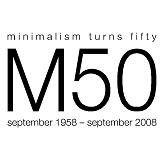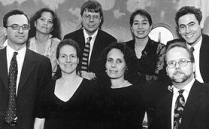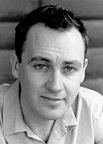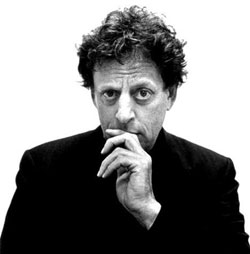
This September marks the 50th anniversary of musical Minimalism, an artistic revolution which critic Kyle Gann has described as “the most important musico-historical event of my lifetime.” I’m delighted to announce that Sequenza21, in collaboration with the exciting new concert series Music On MacDougal, will be celebrating this important milestone with a concert of early Minimalist music.
When: September 17th, 2008 at 8:00 PM
Where: The Players Theatre, in Greenwich Village, Manhattan
115 MacDougal Street, New York, NY 10012
Tickets: By Phone: 212-352-3101 or Online.
Program:
Steve Reich — “Piano Phase” (1967) (Version for two Marimbas)
Philip Glass — “Piece in the Shape of a Square” (1967)
Terry Jennings — “Piano Piece” (December 1958) and “Piano Piece” (June 1960)
Intermission
Terry Riley — “In C” (1964)
We know that this September is the fiftieth anniversary because in September of 1958 La Monte Young completed his “Trio for Strings,” which is generally regarded as the first true Minimalist piece. Young is arranging for a performance of the Trio later in the season, and our concert is focused on representative pieces from the first 10 years of the movement. “Piano Phase” is arguably the high point of Reich’s use of phasing, and a perfect example of his “music as a gradual process.” “Piece in the Shape of a Square” illustrates Glass’s early interest in additive processes. “In C” represents the arrival of the pulsating, repetitive, tonal Minimalism which has dominated the genre ever since.
In some ways the most exciting pieces on the program are the early “Piano Pieces” by Terry Jennings. Jennings (who died tragically in 1981) was the first composer to understand what Young was doing and to follow in his footsteps, and in December 1958, a mere two months after Young completed the “Trio for Strings,” eighteen year old Jennings wrote the first of three “Piano Pieces.” We’re presenting the first two of these pieces, which we believe haven’t been performed publicly since 1989.
This concert is also the inaugural concert of the Players Theatre’s hot new concert series “Music On MacDougal.” Curated by pianist Sheryl Lee, Music On MacDougal promises to become one of New York’s most interesting presenters of new music–classical and otherwise. This season’s lineup includes the DITHER Electric Guitar Quartet, Mantra Percussion, Moet, Newspeak, Grenzenlos, Matrix Music Collaborators, and others. The full season schedule can be found here.
The M50 concert has been sponsored in part by a generous contribution from Cold Blue Records. The performers are a veritable who’s who of hotshot New York musicians. The current lineup (subject to a few changes) is Mike McCurdy (Percussion), Jessica Schmitz (Flute), Elizabeth Janzen (Flute), Joseph Kubera (Piano), Dan Bassin (Trumpet), George Berry (Trombone), Sila Eser (Viola) Gillian Gallagher (Viola), and Adam Havrilla (Bassoon).
This concert is, to the best of our knowledge, the only concert celebrating this important anniversary, so you won’t want to miss it. See you in September!
 Lazy, hazy summer days… Not much really happening, unless you hoof it to some festival or other… Or, for the price of simply wearing out your finger clicking, you could spend the better part of the next couple weeks feasting on the treasure trove that is the
Lazy, hazy summer days… Not much really happening, unless you hoof it to some festival or other… Or, for the price of simply wearing out your finger clicking, you could spend the better part of the next couple weeks feasting on the treasure trove that is the  Dear Friends,
Dear Friends, Michael Berkeley’s Slow Dawn is a revision and reorchestration of a work written three years ago for wind band, which had been commissioned by the British conductor and horn player Tim Reynish as a memorial piece for his son William. Berkeley intended it as a depiction of dawn in Wales where he lives, and follows the deliberate and inexorable tread of the sun from the first hints of light through its early appearance with to its full presence with stabbing rays of daylight. This sunrise is a long way from Daphnis and Chloe (or, for that matter, from Sibelius’s Night Ride and Sunrise, which preceded this piece on this program). Here the focus is on the tread of ‘the kind old sun’ (as Berkeley says, quoting Wilfred Owen) in its endless recurrence and its complete disregard for more transient human concerns. Starting with deliberate slow dirge rhythm in the percussion, which recurs periodically over the its course, the tonalish work builds, via lines which are increasingly quicker and more agitated, over a dense, very closely spaced harmonic texture to a violently rhythmic climax; it leaves a dramatic and satisfying impression.
Michael Berkeley’s Slow Dawn is a revision and reorchestration of a work written three years ago for wind band, which had been commissioned by the British conductor and horn player Tim Reynish as a memorial piece for his son William. Berkeley intended it as a depiction of dawn in Wales where he lives, and follows the deliberate and inexorable tread of the sun from the first hints of light through its early appearance with to its full presence with stabbing rays of daylight. This sunrise is a long way from Daphnis and Chloe (or, for that matter, from Sibelius’s Night Ride and Sunrise, which preceded this piece on this program). Here the focus is on the tread of ‘the kind old sun’ (as Berkeley says, quoting Wilfred Owen) in its endless recurrence and its complete disregard for more transient human concerns. Starting with deliberate slow dirge rhythm in the percussion, which recurs periodically over the its course, the tonalish work builds, via lines which are increasingly quicker and more agitated, over a dense, very closely spaced harmonic texture to a violently rhythmic climax; it leaves a dramatic and satisfying impression. Gaudete by Scottish composer Stuart MacRae is an almost half hour long piece for soprano and large orchestra, setting poems from the book of the same name by Ted Hughes. The piece begins with very arresting ferociously clattering music for the full orchestra which gradually clears to reveal the soprano singing stratospherically high without words. All of this is very effective and it all lands with something of a thud as soon as attention is turned to words, when the voice part, along with everything else, becomes labored and constricted, in terms of both rhythm and tempo.
Gaudete by Scottish composer Stuart MacRae is an almost half hour long piece for soprano and large orchestra, setting poems from the book of the same name by Ted Hughes. The piece begins with very arresting ferociously clattering music for the full orchestra which gradually clears to reveal the soprano singing stratospherically high without words. All of this is very effective and it all lands with something of a thud as soon as attention is turned to words, when the voice part, along with everything else, becomes labored and constricted, in terms of both rhythm and tempo.
 Here’s a big loss to the New York new music community.
Here’s a big loss to the New York new music community. 
 n this age of Dobbsian-fueled immigration hysteria, what could be more timely than an opera about a beautiful Mexican drug smuggler who kills her lover after he betrays her and, in the process, becomes a folk heroine.
n this age of Dobbsian-fueled immigration hysteria, what could be more timely than an opera about a beautiful Mexican drug smuggler who kills her lover after he betrays her and, in the process, becomes a folk heroine.